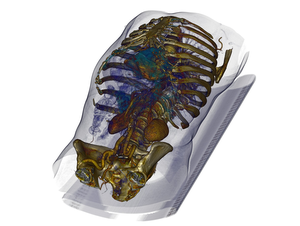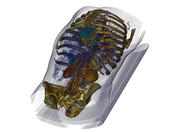Information
- Publication Type: Master Thesis
- Workgroup(s)/Project(s):
- Date: December 2004
- TU Wien Library:
- First Supervisor: Sören Grimm
- Keywords: volume processing, large data
Abstract
Since the development of medical three dimensional imaging devices in the 1970s, volumetric data processing has tremendously gained in importance. With the growing size of the data-sets, exhausting the capabilities of the hardware of its time, methods for efficient volumetric data processing have been always a hot topic. In this diploma thesis two approaches for processing large volumetric data-sets are presented. Both approaches utilize a block volume for storing the data. Further data compression and out-of-core processing are incorporated. Efficiency is achieved by processing only the required portion of data while omitting the non-related data having no effect on the intended result of the algorithm. This is supported by utilization of the knowledge about access patterns of the algorithm. Also methods for optimizing the efficiency by exploiting architectural properties of the computer hardware are presented.Additional Files and Images
Weblinks
No further information available.BibTeX
@mastersthesis{knapp_michael_2004_MAS,
title = "Memory Allocation Strategies for Large Volumetric Data-Sets",
author = "Michael Knapp",
year = "2004",
abstract = "Since the development of medical three dimensional imaging
devices in the 1970s, volumetric data processing has
tremendously gained in importance. With the growing size of
the data-sets, exhausting the capabilities of the hardware
of its time, methods for efficient volumetric data
processing have been always a hot topic. In this diploma
thesis two approaches for processing large volumetric
data-sets are presented. Both approaches utilize a block
volume for storing the data. Further data compression and
out-of-core processing are incorporated. Efficiency is
achieved by processing only the required portion of data
while omitting the non-related data having no effect on the
intended result of the algorithm. This is supported by
utilization of the knowledge about access patterns of the
algorithm. Also methods for optimizing the efficiency by
exploiting architectural properties of the computer hardware
are presented.",
month = dec,
address = "Favoritenstrasse 9-11/E193-02, A-1040 Vienna, Austria",
school = "Institute of Computer Graphics and Algorithms, Vienna
University of Technology ",
keywords = "volume processing, large data",
URL = "https://www.cg.tuwien.ac.at/research/publications/2004/knapp_michael_2004_MAS/",
}

 Thesis
Thesis
